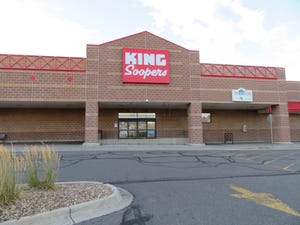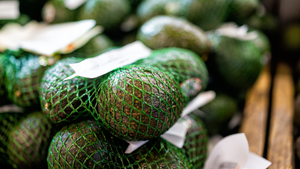EVERYTHING'S KOSHEREVERYTHING'S KOSHER
Kosher offerings are far exceeding the periphery of the Passover Seder plate. As items ranging from Cheerios to M&Ms and Cracker Jack become certified as meeting the requirements of Jewish dietary laws, retailers are catering to a host of shoppers with expanded selections of their once-seasonal offerings. Wakefern's ShopRite has delved deeper into the category with private-label lines, while Giant
July 16, 2007
LIZ PARKS
Kosher offerings are far exceeding the periphery of the Passover Seder plate.
As items ranging from Cheerios to M&Ms and Cracker Jack become certified as meeting the requirements of Jewish dietary laws, retailers are catering to a host of shoppers with expanded selections of their once-seasonal offerings.
Wakefern's ShopRite has delved deeper into the category with private-label lines, while Giant Eagle has created store-within-a-store kosher departments in which specialty items, such as olive oils and pickles imported from Israel, are merchandised.
Their efforts seem well positioned.
Sales of kosher-certified foods reached an estimated $225 billion in the U.S. last year, according to Menachem Lubinsky, chief executive officer of New York-based Lubicom Marketing Consulting, which co-produces the Kosherfest trade show. The company estimates that there are some 101,000 kosher-certified products being sold in the U.S. today, about 17,000 through U.S. supermarkets. Sales during the Passover holiday are quite lucrative, accounting for 40% of annual kosher sales, Lubicom estimates.
“Kosher shoppers are high-income customers, and if you can get them shopping in your stores, it's a higher market basket,” said Howard Breitowich, senior category manager of kosher foods for Tree of Life. “They buy specialty foods. They buy upscale foods. For supermarkets, it's a no-brainer to cater to this consumer.”
Karen Meleta, spokeswoman for Wakefern, noted that about 50 of the retailer-owned cooperative's 200 ShopRite stores, which are located in New York, New Jersey, Connecticut, Pennsylvania and Delaware, serve large kosher consumer bases. Seventeen locations have responded with “Kosher Experience” store-within-a-store departments and, often, kosher meat and fish departments.
KOSHER PRIVATE LABEL
Two years ago, ShopRite also added kosher products to its private-label line. Today about one-third of its store-brand items have been certified kosher. The products include breads and rolls, packaged matzos, chicken broth and frankfurters. Plans for expansion of the line are in the works.
“ShopRite is always looking for opportunities to make more of these items kosher,” said Meleta.
To promote their kosher food departments, chains are using a variety of vehicles, ranging from traditional circulars to word-of-mouth and company websites.
ShopRite's major advertising medium is its circulars.
Kosher inserts typically highlight specialty brands such as Kedem, Streit's and Gold's. Traditional kosher brands like Manischewitz are also featured, noted Meleta.
The retailer also targets kosher shoppers by publishing a Jewish calendar each year at the start of the Jewish calendar year in September. Coupons are printed in the calendar, which is distributed in-store.
The retailer advertises in Jewish newspapers and supports local community events, including the annual Israel Independence Day parade in Philadelphia.
Its efforts seem to be paying off.
Recently, two ShopRite locations were recognized as providing the “Best of Kosher Philadelphia” during a consumer survey, conducted by Kosher Community Surveys. They were its Cherry Hill, N.J., location, which has a 3,300-square-foot “Kosher Experience” department, and its Philadelphia store, which features a 2,500-square-foot kosher section.
The eight-store Kowal-ski's Markets chain, Woodbury, Minn., has had four-foot kosher departments in half of its stores for the past six years. Its kosher sets are part of its ethnic food aisle, which also includes Italian, Spanish and Asian fare.
“We put in basic kosher departments where it makes sense,” said Debbie Leland, specialty foods buyer for the retailer. “We have some stores where we practically share a backyard with a temple, so we have a specific demographic that we serve. It's a way for us to take care of our customers.”
Most of the items in the department are everyday necessities such as crackers, soup, matzos, noodles, potato pancakes, juice and gefilte fish. Almost all of the kosher items it carries are from Manischewitz.
During Jewish holiday seasons, Kowalski's promotes its Kosher offerings with endcap displays and freestanding tables of products.
“We also have an extensive gift department in our stores, so we will take food items — especially chocolates and candies — during the Jewish holidays and tie them in with candles and gift items,” Leland said.
Sales at Kowalski's usually only surge during holiday seasons.
“Our customers have pretty much taken the department for granted, but if we run out of things, especially candles during the holidays when we get last-minute runs, they let us know,” she noted. “It's a convenience for them to be able to shop us for these items.”
Pittsburgh-based Giant Eagle has two “Market District” stores, each with 500-item kosher sections and a deli created with the guidance of rabbis. Its Bethel Park, Pa., store features a 12-foot Israeli food section that stocks about 160 stockkeeping units, including such popular kosher brands as Kedem, Yehuda and Gefen.
Carrying these imported products adds to Giant Eagle's commitment “to providing customers with unique, hard-to-find items from around the world,” said Giant Eagle spokesman Dan Donovan.
Supermarkets introducing Israeli food to the U.S. marketplace have been “extremely important to driving kosher food sales,” said Tree of Life's Breitowich.
He noted that sales of food imported from Israel have grown to $100 million, at a rate of 30% annually. “This is largely due to the strong support of Israel by the Jewish community at large, and the fact that over 750,000 Israeli-born Jews now live in the U.S.,” he said.
“I've seen one retailer drive unit sales up 40% just by changing the mix of kosher products they carry and updating it to include a wide variety of new items, including many imported from Israel.”
neighborhoods. Kosher is mainstream today.”
PICK AND CLICK
Giant Eagle last year introduced a new online special-order service for hard-to-find international, organic, kosher and dietary specialty items on its website.
A link from the retailer's site directs online shoppers to a Web page owned and operated by Kehe Food Distributors. Consumers can find a wide variety of often hard-to-find kosher brands like Kedem and Hodgson Mills. Visitors are also given the option to request a brand if they can't find their favorites. Services like these are drawing a broad range of consumers.
“There are people buying [kosher] brands because they have the perception that they are better or safer,” said Breitowich.
In fact, it turns out that many kosher shoppers aren't even Jewish.
“Vegetarians and lactose-intolerant people are buying kosher,” Breitowich noted. “Religious groups like Seventh Day Adventists are also buying these foods for religious reasons.”
Seventh Day Adventists abstain from alcohol and tobacco, eat only kosher foods and adhere to a vegetarian diet.
According to a consumer kosher foods survey conducted by Chicago-based Mintel, 21% of all American adults buy kosher foods, at least occasionally. Fifty-five percent of adults who buy kosher products do so because they believe the products are safer and healthier than regular food, while 38% said they buy kosher because they want to ensure that what they're eating is vegetarian, according to the survey. Another 24% said they buy kosher because they want dairy-free products, and they rely on the kosher symbol to tell them that a product is totally dairy-free.
“I think it's clear that kosher foods are becoming a big deal,” said Marcia Mogelonsky, the analyst with Mintel who produced the report. “You are seeing more and more companies producing kosher foods, and it makes sense. If you are starting a food company and you can make your products kosher with one more step, why not do it? So many people look at the kosher certifications as if it were the Good Housekeeping Seal of Approval on food. People really think it's healthier.”
In the last few years, the number of factories and products that have been certified as organic has experienced “high-double-digit increases,” said Rabbi Moshe Elefant, chief operating officer of the New York-based Orthodox Union (OU), a nonprofit kosher certifying agency. “Twenty years ago, we were certifying a little below 3,000 factories each year. Now we certify over 6,500 a year in all 50 states and 80 countries around the world. I'd estimate that 50% of all packaged groceries in a supermarket today are kosher and carry the OU label. It would be closer to 65% for supermarkets located in Jewish
About the Author
You May Also Like




